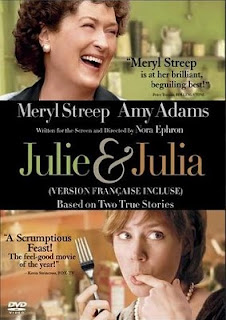I watched Julie & Julia in two approximately equal chunks almost two weeks apart, on the Emirates Air flights from Sydney to Auckland and back again.
(As an aside, I had no problem with breaking the story in two like this. I often watch movies and even hour-long TV shows in chunks of 10–15 minutes at a shot: a bit with dinner, a bit with dessert, a bit while folding laundry, etc. My boyfriend is a bit boggled by this; if he can’t dedicate the time to watch the entire thing at one sitting, he’ll wait until later. I guess I can chalk this up to reading comic books: over the course of 30 years, I am incredibly used to reading a 4, 6, or 12-part story in 22-page chunks, with 30 days between chunks, so I’ve gained the skill of being able to recall sufficient details to re-immerse myself in the story with ease. See: more proof that reading comics makes you a superior human being. It strengthens the memory!)
Back to the movie, the story involves a woman deciding on a project to do all the recipes in Julia Child’s Mastering the Art of French Cooking over the course of a year (and to blog about it), intercut with a biography of Julia Child as she developed her passion for French cooking and worked on the book.
Thoughts:
- Meryl Streep is fantastic as Julia Child. While she initially comes across over-the-top, chewing the scenery, that is apparently how Julia Child was; the character is consistent throughout. Streep inhabits the role completely, and deserved the Oscar nomination she got for it.
- I’m not sure what genre you would put this in. It’s not a romantic comedy; while there is some romance involved in both storylines, there are none of the standard tropes of the genre. I guess it’s “biography”, but because half the film is disconnected from the bio portion, that’s not a good fit, either.
- There is a certain amount of screen time given to the idea that this task of doing all these recipes in a year is a challenge, but in the end, the self-imposed deadline doesn’t play into things much at all. Where is the (artificial) tension attached to “I’ve got 30 recipes left to do and only 7 days! How can I do it?” (Ultimately, the answer to this should be “So it takes you a year and 3 days. Big deal.” Do you “fail” if your planning 11 months ago missed by a couple days and left you no buffer? Maybe that’s why they didn’t put that tension into, because it would have seemed artificial.)
- I suppose that in the 500+ recipes in the book, there are not 365 main dishes, one a day for a year. There are probably some 100 main dishes, about 100 desserts, 100 side dishes, etc. So while the movie implied French dinner after French dinner after French dinner, I suspect the reality was more like two meals a week from the book, and maybe a smattering of French side dishes or desserts to accompany more traditional American fare (you know: Italian, Chinese, Ethiopian,…). That would be much more reasonable, but I suppose it would sap even more tension from the film.
- After watching this, I briefly had the desire to do the same (without the blog) with one of the cookbooks I have, but then I realized that it’s ultimately a stupid idea. Where is the value in forcing yourself to cook (and eat) things that maybe you don’t like, that you aren’t interested in? And more, you don’t master a recipe, much less a technique, by doing it once and then moving on to the next.
- They did have a couple hits on Julie having troubles conquering a couple of the tasks, and one where the resulting dish was underseasoned, but in general, Julie apparently breezed through most of the recipes, with no spectacular failures (other than the first aspic, maybe). That drained (strained?) some of the tension out of the film. At worst, she mastered everything on the second try, apparently. (Frankly, they missed an opportunity there, maybe, to have something be horrible and they go get pizza — in the restaurant downstairs. Why put them over a pizzeria if they never resort to it?)
- There was a little reference to how calorie-filled some of the recipes are, but that was way underplayed, and the concept of eating all the leftovers (since there are only the two of them, usually) was completely missing.
- If there is one take-away (heh) from this film for every viewer, it should be “Butter”. I already knew that — via Anthony Bourdain, and before that a “How to pack on the calories if you are wasting away from AIDS” column in the Bay Area Reporter in the 1990s — but it’s something I’m only just now really bringing into my own cooking consciousness. Reinforcement is good.


No comments:
Post a Comment